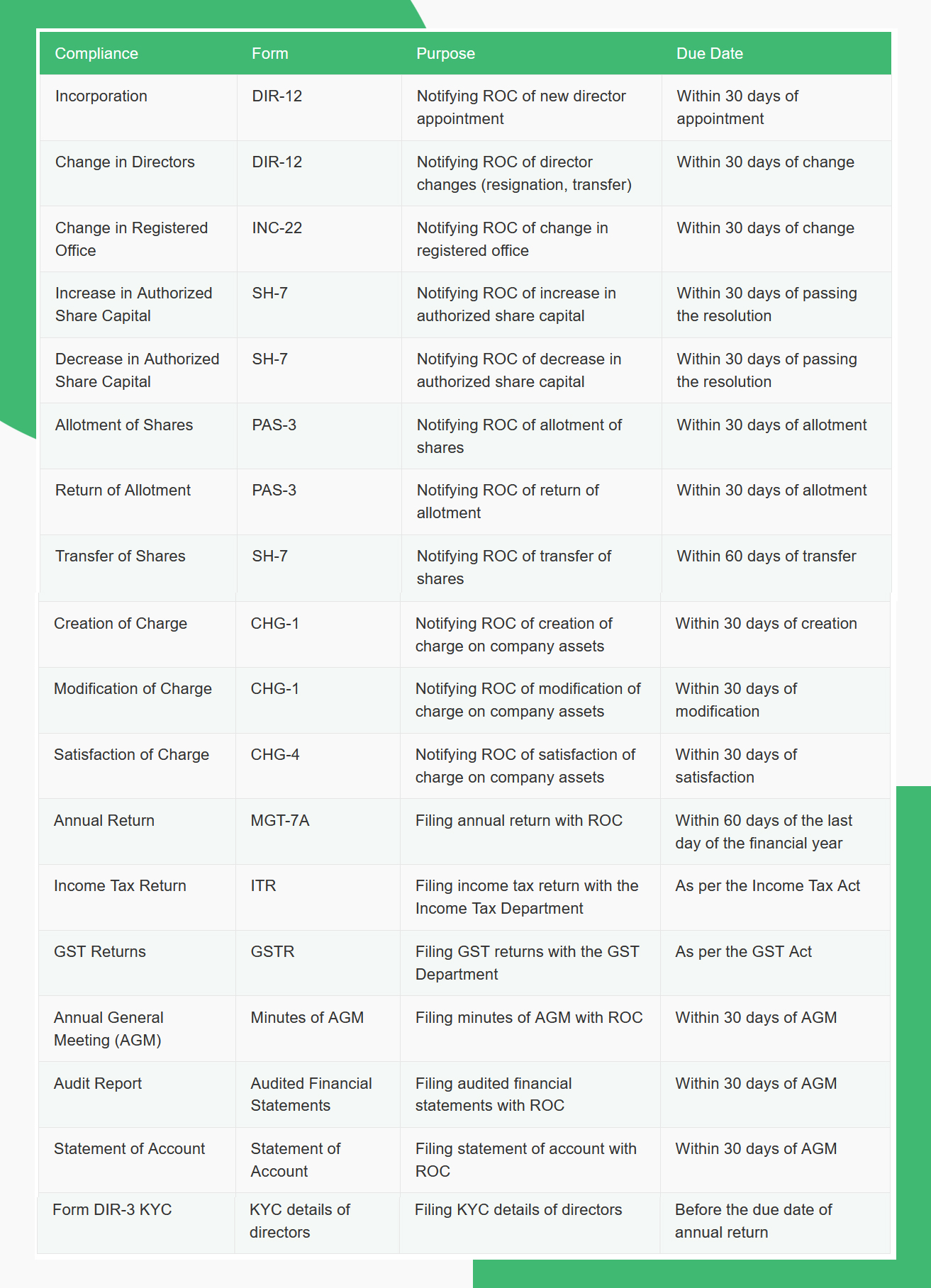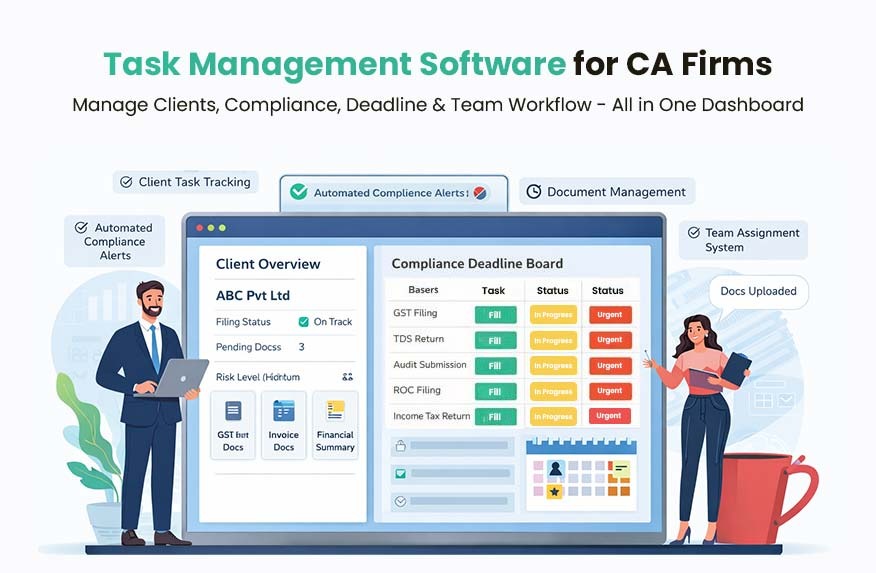
The rules of ROC (Registrar of Companies) compliance to follow are beyond a legal requirement for Private Limited Companies, which means building trust and making the way for future success.
The Companies Act of 2013 mandates that companies are mandated to submit annual reports, keep important records current, hold regular meetings among their leaders, and be open about their operations.
It is being obligated and accountable in business. When a company adheres to the ROC regulations, it shows its devotion to being honest, responsible, and well-managed. The same creates a stringent reputation that supports the investors’ trust in the company more, which in turn assists in future growth and success
Obligatory Compliances for Private Limited Companies
This section covers the rules and regulations that private limited companies must follow. It includes important topics such as holding board meetings, conducting annual general meetings, maintaining necessary company records, and complying with specific events or changes, such as the appointment or change of directors. Additionally, it provides a detailed list of requirements related to employee gratuity, a benefit paid to workers upon leaving the company.
Companies Board Meetings
Private limited companies need to conduct regular meetings with their board members to discuss significant problems and ensure that things function smoothly. For making effective decisions, following the rules, and planning for the future, these meetings are important. Boards ‘ regular meetings can set objectives, verify the company’s performance, and manage any challenges that may arise in daily operations.
AGM (Annual General Meeting)
The Annual General Meeting, or AGM, is a crucial event where company owners and leaders come together to talk about the performance of the business. In this meeting, the discussion is around the company’s finances, its successes, and plans for the future. For keeping everything open and honest, AGMs are significant since they provide the shareholders a chance to ask questions and understand the company’s ongoing concerns.
A Statement of Interest
Private limited companies’ directors need to let others know if they have any potential conflicts of interest because of their links to other businesses or deals that could affect their company. Through sharing the same details, they promote honesty and transparency, avoid conflicts, and fulfil their responsibility to act in the best interest of the company and its shareholders.
Tax and Annual Returns Filing
To adhere to the tax regulations, Private limited companies would be mandated to file their annual income tax returns. They shall be required to submit an annual report to the Registrar of Companies. The same report assists in keeping the records of the public updated for the company’s financial situation, its directors, and its shareholders.
The Statutory Registers
Private limited companies need to maintain crucial records like lists of their members, directors, and any financial charges. For meeting legal requirements and helping ensure that the company operates clearly and responsibly, these records are important. They encourage openness for those who are engaged in the company and how it is executed, which is crucial for trust and accountability.
Details For Director Identification Numbers
Under the law, all the directors of companies are mandated to have a special identification number called a Director Identification Number (DIN). Every year, they are required to fill out the form called DIR-3 KYC and send the same to the Registrar of Companies. The same form comprises significant personal details for that fiscal year. If a director is unable to finish the same procedure within time, then their DIN can be deactivated, and they may also need to pay a fine of Rs. 5000/- for submitting the form late.
The Beginning of Business
After a certain date, Private limited companies that are set up would be required to get a special document known as a Certificate of Commencement of Business (COCB). The same document is crucial as it officially validates that the company is legally registered and ready to initiate its operations. Private limited companies, by complying with these norms, can ensure that they are functioning legally and transparently, which helps in building trust with everyone engaged, along with the customers and investors. It supports maintaining the company running more easily and honestly.
Compliance-Based Event
Private companies have a crucial job when specific events occur within their organization. Such events, like major amendments or essential occurrences, mandated the company to share the particular data with the Registrar of Companies (ROC). It is significant to stay compliant with the law and keep transparency. Particularly when something important takes place, the company should act quickly to keep everything above board.
The private limited companies need to monitor the track of significant events and activities in the year, and particular forms are mandated to be completed as part of their obligations. Such forms assist in ensuring that the company complies with the legal rules and functions easily.
The Change of Directors
Requirement:- Private limited companies would be required to notify the Registrar of Companies (ROC) of any changes to their directors. It comprises when someone is hired, resigns, or if there is a change in their role.
Form:- Form DIR-12 is commonly used for this purpose.
Objectives:- Ensuring that the data for the company’s board members is true and current while following all the obligatory needs.
An Amendment to the Authorized Share Capital
Requirement:- If a Private limited company chooses to revise the amount of capital it has, then it is mandated to notify the Registrar of Companies (ROC) within 30 days of making that decision through a vote.
Form:- For the same objective, Form SH-7 is used.
Objectives:- Let the related authorities learn about the company’s new share capital setup, keep detailed and precise records, and ensure everything follows the law.
Information For Allotment of Return
Requirement:- When a private limited company wishes to make new shares for sale, it is mandatory to submit a report to the Registrar of Companies (ROC) for this new share allocation.
Form:- Form PAS-3 is utilised for the same objective.
Objectives:- Share the data for the distribution of shares. It comprises how many shares were given out, who received them, and how much money was paid for them.
The Creation and Amendment of Charges
Requirement:- It is crucial for private limited companies to submit a form whenever they make or revise any agreements that comprise their assets.
Form:- Form CHG-1 is utilised for the same objective.
Objectives:- It is significant to share the data of any financial liabilities, be open to what those obligations entail, and adhere to the norms specified in the Companies Act.
The Registration of Satisfaction with the Charge
Requirement:- After a company has paid off a debt or has had a lien removed from its assets, it is required to submit a form to the Registrar of Companies (ROC) to officially document that this obligation has been satisfied.
Form:- Form CHG-4 is utilized for this objective.
Objective:- It is directed to validate that the payment has been completed ensuring the records of the company are up to date while complying with statutory norms.
Private limited companies, by complying with such norms pertinent to the particular events, can depict that they care for complying with the statute, being transparent and practising good management.
Overview of Private Limited Companies for ROC Compliance
Updating the rules for ROC (Registrar of Companies) compliance cannot be easy for private limited companies, as there are various distinct needs to comply with. To facilitate comprehension and assist in ensuring that everything is perfect, below is a simple table that lists the various forms required and what each one is for.

Frequently Asked Questions about ROC Compliance
Q.1 What is the Method to check ROC Compliance?
If you wish to discover the ROC filing status, then begin it by visiting the MCA website and logging in with your account information. Once you are logged in then see the MCA services section and tap on the company e-filing. In that, you shall discover an option called “Check ROC Filing Status.” Enter your Corporate Identification Number (CIN) or Limited Liability Partnership Identification Number (LLPIN), and you’ll be allowed to see the filing status. You can also use EazeMax software for MCA compliance, developed by SAG Infotech Private Limited.
Q.2 What shall Arrive in the ROC Filing?
For all businesses registered under the Companies Act, it is important to file with the Registrar of Companies (ROC). Under this the process comprises sending in crucial documents and financial information to the ROC. It ensures that the companies comply with all the provisions of law which they are mandated to.
Q.3 Who is Supposed to Submit a Complaint to the ROC?
You have two options to choose from if you desire to submit a complaint against a company. The first method is to manage it online using the PG Portal or the MCA21 website. If you wish to do things traditionally, then you could file your complaint in person by reaching out to the head office of the Ministry of Corporate Affairs (MCA) or the local office for company-related matters (known as the Regional Director of Companies).
Disclaimer: The information provided here is sourced from reliable and verified resources and published after careful review. However, any inaccuracies or changes in details should be regarded as human error. Our blog aims to deliver updated content, and we welcome any queries related to the blog’s subject matter. Please note that we do not offer consultancy services and, therefore, cannot respond to such requests. Our responses are based on practical insights, and we recommend cross-verifying information with professional authorities for complete accuracy.





